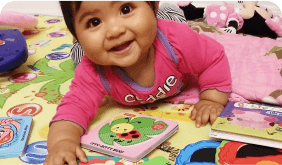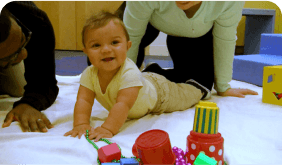Ways to comfort your child include staying close, encouraging movement, and giving them an outlet to express their feelings.
Take a gradual approach when helping your child face their fears, and be sure to praise their small accomplishments.
Reach out for extra guidance if needed—talk to a healthcare provider if your child’s anxiety starts affecting their daily life.

No parent wants to see their child upset, but sometimes it’s hard to know how to react when your child is nervous or afraid. Do you hug them? Do you let them cry it out? There’s so much conflicting advice out there! Next time you’re faced with reacting to your nervous or fearful child, try these tried and true tips on how to comfort them.
Do’s and Don’ts for Helping Kids Overcome Nervousness
Do Be There
For many children, your presence will help calm them. Hug them or hold them on your lap. Even holding their hand can help give them a sense of security and comfort.
Do Get Moving
Physical activity can be calming during times of high stress. Running, doing cartwheels, or playing a game involving gross motor movements can help distract them from their worry or fear. Check out our tips for encouraging children to be physically active.
Discover 4 ways kids benefit from exercise that have nothing to do with fitness.
Do Talk It Out
Having the opportunity to express what you’re feeling is important, especially for children. Give them some one-on-one time and listen without judging or discounting their anxiety. The best time to talk it out is when they are feeling calm because they are able to listen to you more easily.

Do Allow For Expression, Even If They Can’t Explain Their Worries
If your child has trouble talking about why they are nervous, there are other ways to start the conversation. Ask them to draw a picture or act out what they are afraid of with a doll, puppet, or stuffed animal.
Do Empathize
Even if what they are afraid of seems silly to you, it’s important to show your child that you understand. Although they may not truly have anything to be fearful of, the emotions they are feeling are very real.
Learn more about social-emotional skills in children and what you can do to help your child’s social-emotional development.
Don’t Be Too Involved
By telling your child exactly what to do or even what to say in stressful and challenging situations, they are not able to solve problems on their own or learn ways to cope by themselves. This doesn’t mean they’ll never need help, but you should let them try to problem solve first before offering a helpful hand.
💡This social-emotional tool can help your child learn to regulate emotions on their own.
Don’t Avoid Activities
If children consistently avoid activities that trigger fear or discomfort, those fears may continue. But instead of having your child do every activity against their wishes, try encouraging gradual exposure to challenging situations. This approach helps children adapt at their own pace, allowing them to conquer their fears step by step.
For instance, if your child struggles with playing with others at school, try organizing a playdate at home. This way, they can focus on building comfort around one child before facing the larger group dynamics on the school playground.
Does your child get nervous when meeting new people? See these tips to help with stranger anxiety in babies and children!
Don’t Overly Reassure
Telling your child that “everything will be okay” might actually confirm to your child that there is something to fear. While it’s hard to resist the instinct to reassure your child that everything will be okay, it might be best in the long run.

Don’t Get Impatient
Not knowing how to help can be hard and frustrating for parents, but don’t let those emotions show. Your child can sense how you’re feeling. Revealing your emotions could make your child feel like they’ve upset you, increase their nervousness, and make communicating more difficult. Try to set an example of how to react calmly to help your child feel calmer as well.
Don’t Wait Until They Are 100% Anxiety Free to Reward Their Behavior
Encourage and praise small accomplishments. Being brave while facing things they are afraid of or are feeling nervous about is something to celebrate! Here are some ways to praise your child beyond “good job!”.
Recognizing When Professional Help is Needed
Kids are bound to feel nervous or fearful from time to time throughout childhood; after all, so much is still new to them! These emotions typically get less frequent as children gain confidence through knowledge and experience. However, some children may have a particularly hard time in social situations and need extra help coping with their emotions. If you suspect your child is experiencing symptoms of social anxiety, reach out to their healthcare provider for support and guidance.





